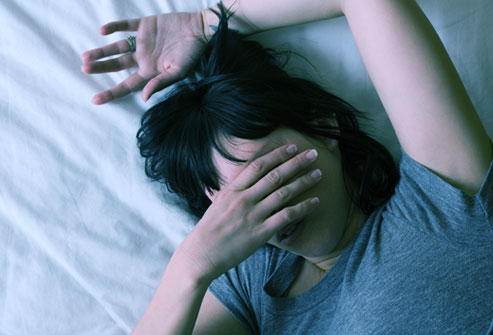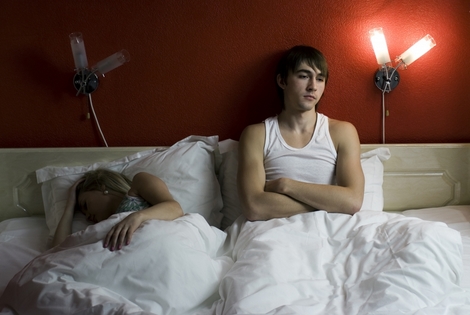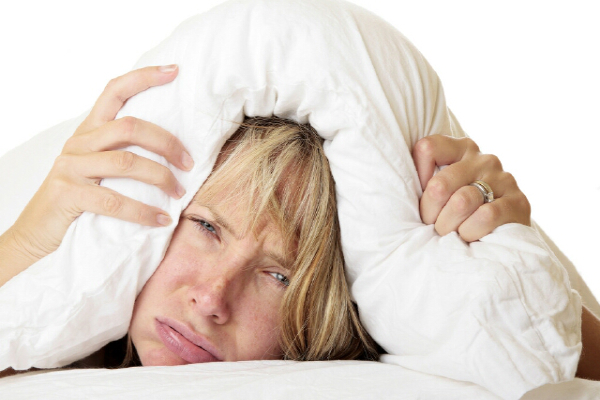The word insomnia originates from the Latin ‘in’ meaning no and ‘somnus’ meaning sleep. Insomnia is the most common sleep disorder affecting millions of people worldwide. It causes sleeplessness and is characterized by the inability to fall asleep or stay asleep. This leads to unrefreshing and non-restoring sleep and can have devastating effects on the mind and body.

Insomnia, more often than not, occurs as a result of some other problem. It can occur independently; however, it is usually the symptom of some other problem or disorder. Insomnia occurs generally due to psychological stress, chronic pain, restless leg syndrome, hyperthyroidism, and several other medical conditions.
Insomnia is usually diagnosed by physical examinations, medical history, and sleep history. Sleep studies using polysomnography are also done to determine insomnia. Sometimes insomnia is present for a short period of time and goes away on its own. Insomnia that lasts for a longer period of time may need treatments and solutions. Treatment largely depends upon the cause of insomnia and may include medications, therapy, sleeping pills, cognitive behavioural therapy, sleep disorder treatment, etc.
Types of Insomnia
Insomnia can be acute or chronic. Acute insomnia is a short term insomnia that occurs due to certain changes in lifestyle such as stress of a new job, examinations, etc. That usually lasts for a few days or a few weeks. Chronic insomnia is a long term insomnia lasting from a few months to a few years. There are two types of chronic insomnia; primary and secondary insomnia. Primary insomnia is not a result of any underlying disease or condition and affects the daytime functioning. Secondary insomnia is a symptom or a side effect of some other disorders like depression, anxiety, chronic illness, etc.
Treatment of insomnia has a pharmaceutical as well as non-pharmaceutical approach. Insomnia can be treated by inducing certain lifestyle changes like reducing caffeine intake, avoiding exercise close to the bed time, increasing exposure to sunlight, etc. to name a few.
Treatment for Insomnia
Suggested treatment and changes include home remedies as well as medical therapies and may include the following:
Good Sleep Hygiene:
Having a good sleep hygiene is the most important aspect in overcoming difficulties faced regarding sleep. Good sleep habits can promote good sleep and help beat insomnia. Going to bed at the same time every night can help you sleep well. Avoid using gadgets that give off light before bed. It can make it harder to fall asleep. Increase exposure to sunlight. This regulates the melatonin production which in turn regulates the sleep-wake cycle of the body.
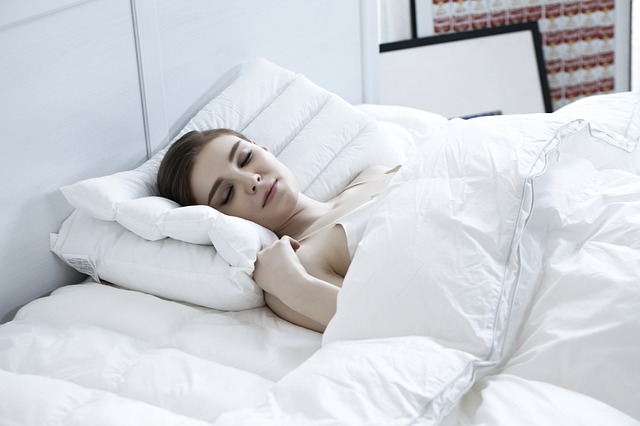
A proper environment to fall asleep includes a room that is dark, set at right temperature, and is quiet. Earplugs and sleeping masks can help drown out the lights and sounds, if they are a problem. Avoid associating other activities with bed. Use your bed only for sleeping and relaxing. A good sleep hygiene promotes healthy living.
Reduce Caffeine, Nicotine, and Alcohol Intake:
Caffeine stimulates the body into hyper active mode and makes it harder to fall asleep. This can hinder with the normal sleep routine. Avoiding caffeine and caffeinated drinks a few hours before bed is suggested as caffeine can have disruptive effects on your sleep. This is because it blocks the adenosine receptor, a substance that promotes sleepiness, and keeps you from feeling sleepy.

Nicotine and alcohol before bedtime have a negative impact on the sleep schedule of a person. This is because they are stimulants and hence disrupt the sleep cycle. Nicotine levels decrease in the morning and may cause a person to wake up at ungodly hours to satisfy the craving. This disrupts the sleep leading to insufficient amount of sleep for an individual. Similarly, alcohol may help fall asleep quickly but its breaking down has a stimulant effect. This can cause a person to wake up early or several times during the night.
Hence, avoiding these stimulants is the best way to treat insomnia at home. This does not necessarily mean you have to stop smoking or drinking. But, limiting yourself to a glass of wine at dinner or smoking 4-5 hours before bedtime, can ensure you will have a satisfying sleep at night.
Meditation:
Meditation is a mind calming practice that has shown to promote sleep by focusing on breathing and awareness. It helps in breaking the train of stressful thoughts and worries, and evokes a relaxation response. As the mind calms, you begin to feel the effects of sleep. Meditation is the best treatment for people who want to treat their insomnia with no medications.

This technique increases the sleep time, reduces measures of arousal in the brain, helps reduce the intake of sleeping pills, and reduces stress and anxiety. This ultimately helps in falling asleep faster and staying asleep for a longer period of time.
Cognitive Behavioural Therapy:
Cognitive behavioural therapy for insomnia (CBT-I) is a treatment technique for insomnia that works with or without medications. CBT-I aims at improving the sleep habits by bringing about a change in the behavioural patterns and thoughts that may affect a person’s ability to sleep. It focuses on treatment of underlying causes. Once the causes have been identified, steps towards generating a better sleep schedule are taken.
These steps involve:
1. Stimulus Control
2. Sleep Hygiene
3. Sleep Restriction
4. Relaxation Training, and
5. Cognitive Therapy
Stimulus control aims to associate the bed with sleeping and guides people with insomnia to limit their activities in bed to sleep and sex, get out of the bed at the same time every day, and go to bed only when they are tired.
Sleep hygiene maximizes the hours of sleeping and ensures a peaceful and restful sleep. It mainly focuses on controlling the bed time rituals and sleeping environment to provide a good night’s sleep.
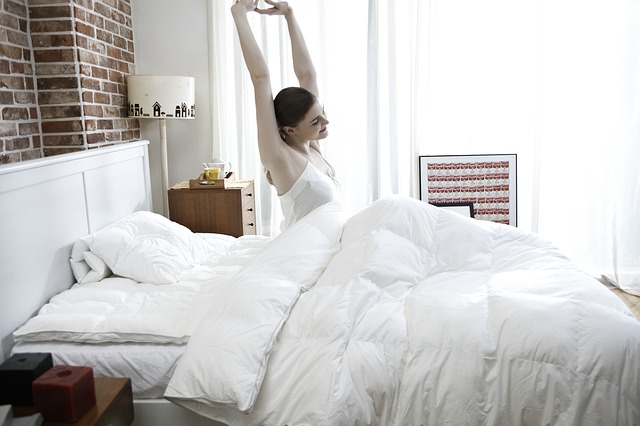
Sleep restriction aims at limiting the amount of time a person is asleep for. Insomniacs spend a lot of time in bed wide awake, leading to frustration and anxiety. This leads to the brain forming a negative connection between the bed and sleep. So, restricting the amount of time a person spends in bed is beneficial. Sleep restriction therapy is the most difficult step of CBT-I as it works by restricting the sleep time but causes an increase in the depth of sleep.
Relaxation therapy utilizes a number of techniques that help a person relax throughout the day and especially close to bedtime. These techniques help sort out thoughts and worries and help insomniacs relax. Meditation, guided imagery, etc. are some of the techniques that are used.
Cognitive therapy in CBT-I often aims at dispelling the beliefs and attitudes regarding sleep. It offers education regarding these thoughts and beliefs and how they affect the sleep cycle. Therapists often point out flaws in the beliefs, or subject the patient to situations that compel them to test their own beliefs. Therapists work to control the worry of patients by writing down their concerns, and approaching and solving them together, one at a time.
Medications:
There is a wide range of medications that are helpful in treating insomnia. These sleeping pills are often termed as hypnotics. Antihistamine such as diphenhydramine (Benadryl) is an example of one of the most commonly used over-the-counter medications to treat insomnia. These medications can have side effects and hence consulting a doctor is often advised.
 Prescription medications include anti-depressants, sedatives, antihistamines, and melatonin receptor agonists. These medications have a variety of therapeutic effects and are often used to treat sleep disorders.
Prescription medications include anti-depressants, sedatives, antihistamines, and melatonin receptor agonists. These medications have a variety of therapeutic effects and are often used to treat sleep disorders.
Certain medicinal herbs like Valerian roots, chamomile extracts, lavender, etc. are used as natural remedies to treat insomnia as they have natural medicinal and sedative properties. Some other herbs such as passionflower, lemon balm, and hops, are also promoted as effective sleep remedies. Some essential oils also improve sleep quality, decrease stress, relax the body, and promote better sleep.
Insomnia may be one of the most debilitating, exhausting, and chronic sleep disorder but it is not incurable. Figuring out the reasons and causes for insomnia can help people treat and overcome the disorder. Most of the cases of insomnia are related to stress, anxiety, depression, lifestyle choices, lack of exercise, poor sleep hygiene, chronic illness, or side effects of certain medications.
Insomnia can be treated with behavioural therapies, improving sleep habits, and identifying and treating the underlying causes. It is important to consult a sleep specialist to help cope with insomnia. Lifestyle changes and behavioural treatment can help people who do not want to treat insomnia with medications. And, medications are available for those who need it.
A good night’s sleep equals a good day and vice versa. Taking care of yourself day and night can ensure you get the best sleep. Make sure your daytime activities consist of healthy habits such as exercise, meditation, etc. Healthy lifestyle promotes a better sleep routine. A good night’s sleep is essential for providing rest and restoration to mind and body, and promotes healthy living.
